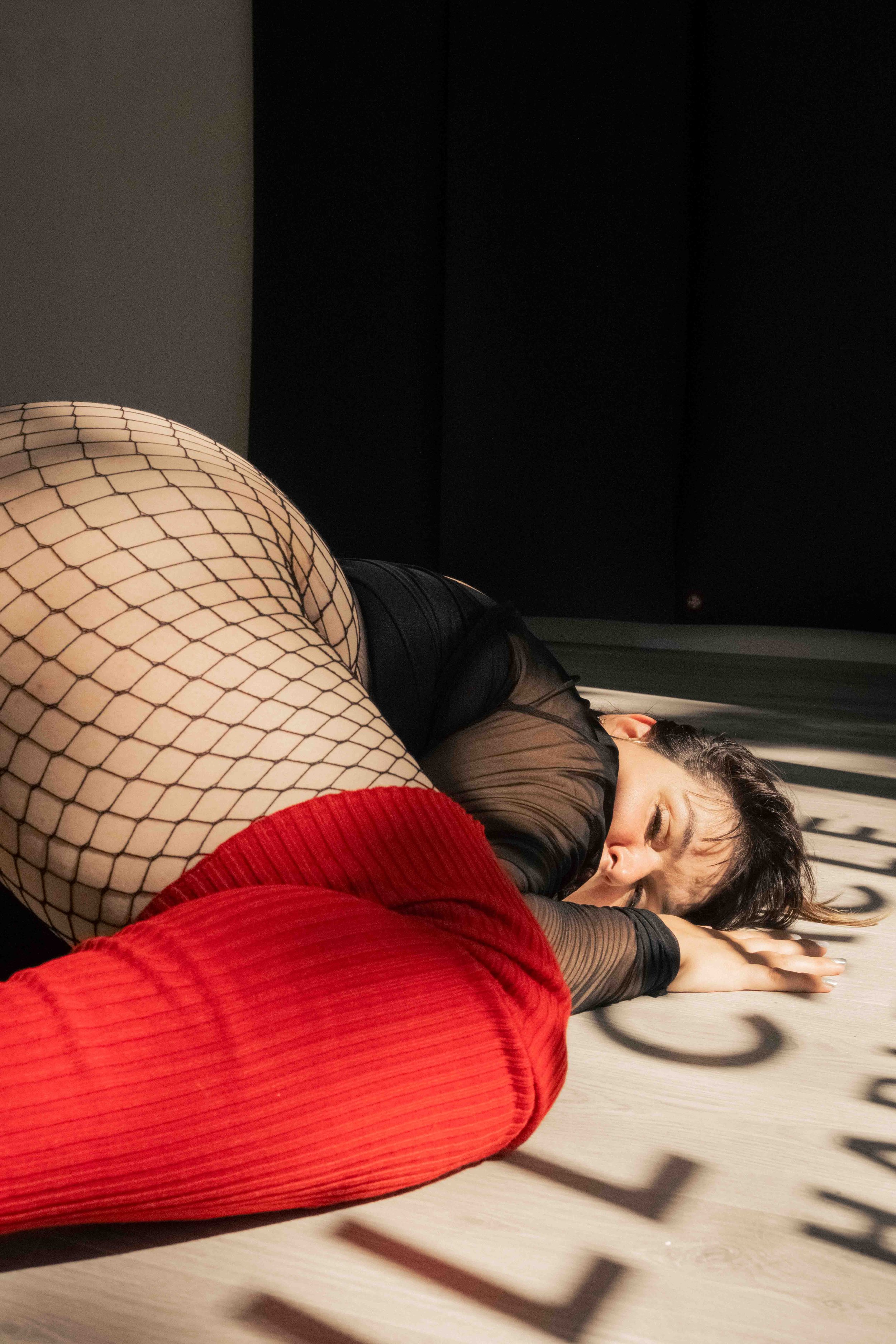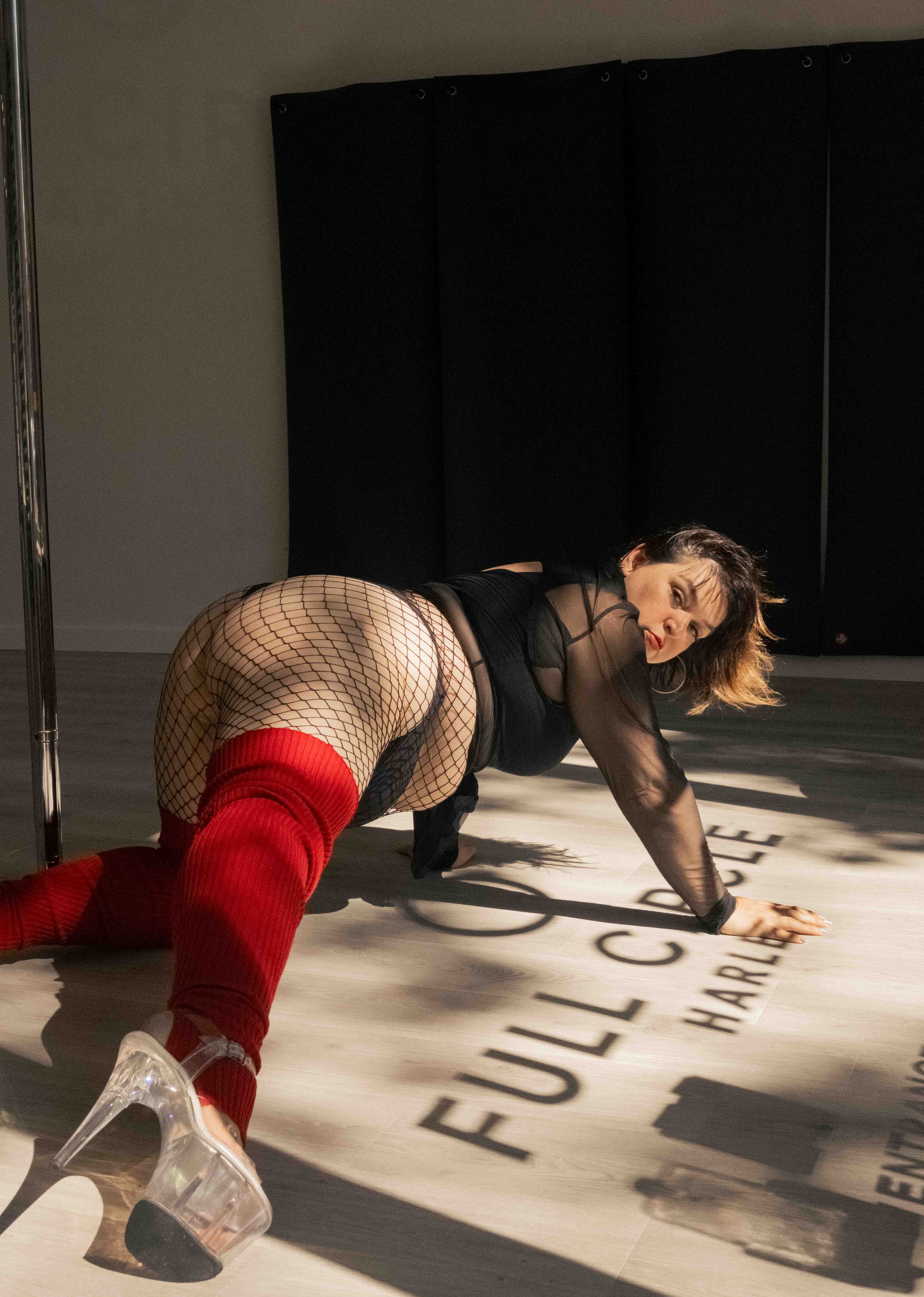nickoleta
45, Queens, NYC.
N: My name is Nickoleta. I am based in New York, I live in Queens. I train mostly in Brooklyn, and now I also train in Harlem. I actually poling Easter Sunday of 2019 when I took my very first intro class. I’m not a particularly religious person, but I was kind of like, oh, well, this is a resurrection of me. l was 39 at the time, I'll be 45 next month and I definitely would not have imagined at any point in my life that this is what I would be doing in my mid 40s.
A: I don't want to say you found pole later in life, because you're really still young, but I suppose you did have a whole career before this, right? So what did life look like before pole for you and how has changed since finding it?
N: My general day to day life, I was teaching middle school and high school, so pole was really just a hobby that I did after school and on the weekends. I think at first I couldn't be as public as I wanted to, you know what I mean? I wasn't gonna tell my middle school students, here's what I'm doing after school today! One of the very first things I did after I quit my teaching job was make my Instagram public, not because I want to be an influencer or anything like that, but just because I could. I couldn't do that before because society wants teachers to be these perfect saintly role models and not acknowledge that we have lives, and we have social lives, and we do some things that are maybe not as wholesome. I think in a more general sense, not necessarily related to career or anything, I'm just a lot more confident than I ever was before and just ready to explore different parts of myself.
It's also really driven home the point of something I would always tell my students but didn't necessarily follow myself about how it's okay if you don't get something the first time it's okay if you find something difficult, it's okay if you fail at something, you just keep trying it. Doing pole has forced me to take that advice, because I'm not going to get something the first time. Knowing me, I'm not going to get it the 100th time either. It takes a while and as someone who is in a bigger body than a lot of people you see pole dancing, it's going to take me 10 or 20 times longer than it'll take other people and that's just a reality.
It’s something that I've had to be gentle with myself about, because it's easy to just say, like, “Oh, this isn't for me!” and at first I was focused on getting all the tricks. I think that's a that's a natural part of just being new to something and being excited about something. I think as a plus size person too, it was even more a salient point, because I wanted to prove that I could do it. The more I explore movement, the less I care about any of that and it's not necessarily because it's harder and takes longer for me. It really is just because as I get older, I don't care as much about that, and I just want to move. I just want to vibe out and have fun and feel good.
A: We kinda spoke about your background as a teacher How are you tending to the little version of you inside, like, how are you looking after her whilst you're learning this process? Because you’re a studio manager, you're also an instructor but you’re still a student in so many respects, how do you nurture your inner student?
N: I think the ways that I'm nurturing my inner student are taking the time to do one or two things, I think maybe being a Libra, has something to do with it, but I'm interested and excited about a lot of things so it's hard for me to decide what I want to focus on because I want to do everything it! What's been really good for me lately is to just focus on one or two things at a time. That's how I've been running my classes lately too, when I teach liquid motion (floor work based class), we'll do two or three moves at the most because I've just been enjoying watching everybody else just really explore one thing and get really deep into as many iterations of that one thing as we can.
It’s funny because it very much connects to when I was a special education teacher and the importance of repetition and understanding a few things really deeply, rather than touching on everything, but not really getting a good understanding of it. So that's kind of where I'm at lately, which has been, I don't want to say it's hard for me to do that, but there is that FOMO of oh, but I'm not working on things higher up the pole or I’m not working on whatever, because I really do love everything, and I want to be involved in all of it but it's felt much more nurturing for me to just really hone in.






A: With your background as a teacher and even just as you said before, as a plus size person. How does that navigate your teaching style as a whole? So all of your lived experiences, how do you bring who you are to the table when teaching your students?
N: My background specifically is in special education, so it's not even a subject specialty. It's learning about how people learn, and understanding the way the brain works - understanding that some people need a lot of repetition, some people need a lot of verbal explanation, some people just need an entry point. So I think especially with the specific classes that I'm teaching, it feeds into that naturally because I mostly teach intro to pole and liquid motion, in any of those classes I feel like the entry points are really important.
The main thing that I was doing when I was teaching in school was finding ways to make this accessible to people. You don't necessarily know by looking at people who's going to need different styles or different entry points. Just because I'm a plus size woman doesn’t mean that someone else who's plus size in my class is going to need the same kind of modifications that I do. We all we have different body types, different backgrounds, different preferences - just willing to try things outm see the person that's in front of you and understand what they might need, and knowing when to step back too. I’ve been in situations where I felt like the instructor was giving me too much attention, because I wasn't really getting it as quickly as other students and I’m just like
“No, it's okay, let me figure this out.” Maybe I just need some time to practice it and I think both in pole instruction and when I was in school, I can really see myself in the students that are in front of me.
A: I feel like empathy is like a driving force in terms of how you approach your teaching. I think that's probably why I felt so at ease in your class. Like most teachers are very patient, but it just something about how you taught me was just very different. Going back to the idea of resurrection, I’d love to know what’s your favourite change you’ve seen in yourself since dancing?
N: I would not have imagined even a couple years ago that this is what I would be doing right now, and that this would be such a big part of my life. Yeah, so the confidence is there, and I think I've always been a creative person, but it's really nice to keep exercising that creativity literally every single day. I think it's easy to kind of get stuck in what you're doing in a day to day situation. And I don't know, sometimes things will just strike, you know, the inspiration will just hit in a different way, like before, when we were even when we were just playing with the the the lights and the way it was coming through the shoes, I was just like, ahh!
I feel like I carry myself differently than I used to. The heels don't hurt. You know? They definitely help! I feel much better when I'm in them, more powerful. I would say that's probably my favourite thing, because I really just feel like, if this is what I'm doing now, in my mid 40s, I can take on anything.